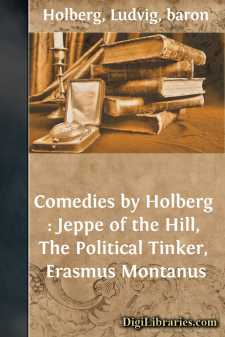Categories
- Antiques & Collectibles 13
- Architecture 36
- Art 48
- Bibles 22
- Biography & Autobiography 813
- Body, Mind & Spirit 142
- Business & Economics 28
- Children's Books 15
- Children's Fiction 12
- Computers 4
- Cooking 94
- Crafts & Hobbies 4
- Drama 346
- Education 46
- Family & Relationships 57
- Fiction 11828
- Games 19
- Gardening 17
- Health & Fitness 34
- History 1377
- House & Home 1
- Humor 147
- Juvenile Fiction 1873
- Juvenile Nonfiction 202
- Language Arts & Disciplines 88
- Law 16
- Literary Collections 686
- Literary Criticism 179
- Mathematics 13
- Medical 41
- Music 40
- Nature 179
- Non-Classifiable 1768
- Performing Arts 7
- Periodicals 1453
- Philosophy 64
- Photography 2
- Poetry 896
- Political Science 203
- Psychology 42
- Reference 154
- Religion 513
- Science 126
- Self-Help 84
- Social Science 81
- Sports & Recreation 34
- Study Aids 3
- Technology & Engineering 59
- Transportation 23
- Travel 463
- True Crime 29
Comedies by Holberg : Jeppe of the Hill, The Political Tinker, Erasmus Montanus
by: Ludvig Holberg
Description:
Excerpt
Ludvig Holberg is generally considered the most remarkable of Danish writers. Though he produced books on international law, finance, and history, as well as satires, biographies, and moral essays, he is chiefly celebrated for his comedies, which still—nearly two hundred years after then composition—delight large audiences in Denmark, and bid fair to be immortal. These comedies were the fruit of the author's actual experience; they are closely related to his other works and reflect the range and diversity of his pursuits. To understand fully Holberg's creations, one must first become acquainted with the events of his life.
Ludvig Holberg was born in Bergen, December 3, 1684, of good parentage on both sides. His mother was a granddaughter of a distinguished bishop, and his father an army officer who had risen from the ranks by personal merit. Bergen had long been a trading-post of the Hanseatic League, and in the seventeenth centurv was distinctly cosmopolitan in character. Perhaps as a result of his environment, Holberg seemed early to have acquired a desire to travel. In any case, he devoted most of the years of his young manhood to seeing the woild.
In 1704, shortly after receiving his degree at the University of Copenhagen, he made a journey to the Netherlands. About a year later, he went to England, where he spent more than two years, partly in Oxford and partly in London, studying history and absorbing new ideas. In
1708, as the tutor of a young Danish boy, he visited Dresden, Leipzig, and Halle. Soon after his return to Copenhagen, he obtained a small stipend in a foundation for students, called Borch's College, While there he wrote two historical treatises of enough value to win him an appointment as "extraordinary" professor in the university. Though this position gave him the right to the first vacancy that might occur in the faculty, it did not entitle him to any salary, and it was only through the good offices of a friend at court that he obtained a stipend of about $150 a year for four years, during which time he was to be a sort of travelling fellow of the university. In the spring of 1714, Holberg, then thirty years of age, left Copenhagen for his fourth journey abroad.
This excursion was far more extensive and picturesque than any he had undertaken before. He travelled first to Paris, by way of Amsterdam and Brussels, and later to Genoa and Rome, by way of Marseilles. Except for the necessary sea voyages, most of the journey was made on foot. After staying in Rome for six months, harassed the entire time by malarial fever, he turned his face towards home. In order to escape the discomforts and perils of travel by sea, he decided to return to Paris overland, and walked from Rome to Florence in fourteen days. Finding his health improved by the regular exercise, he continued on foot over the Alps to Lyons, and subsequently to Paris and Copenhagen, where he arrived in the autumn of 1716. Holberg had gone abroad to satisfy his keen intellectual curiosity; he remained to study in foreign lands, and to observe life as a philosopher and artist. Without his seemingly aimless years of wandering, he might conceivably have become an able historian; he could hardly have developed his brilliant talent for satire and comedy.
When Holberg returned home, he found no vacancy in the faculty. While waiting in penury for the death of some professor, he wrote one of his most successful works of scholarship, an Introduction to International Law. At last, in December, 1717, he inherited, as it were, the chair of metaphysics in the university, being thus forced to begin his academic career by teaching a subject that he held in contempt....


